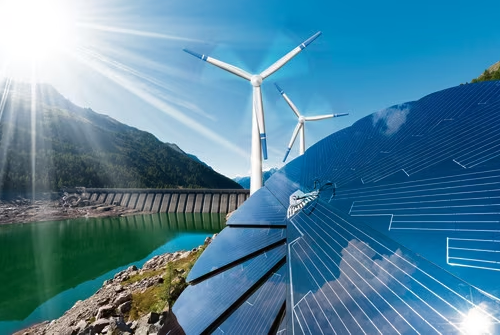Move could help smooth potential planning hurdles for ambitious scheme to unlock African electricity supplies
A plan to build the world’s longest high-voltage undersea cable to carry renewable energy from Morocco to the UK has been designated a project of “national significance” by Britain.
The move could help to smooth any potential planning hurdles for the project, which will require 3,800km of subsea cables to supply solar and wind power from the Sahara to seven million British homes by 2030.
A 10.5 gigawatt project involving solar and wind farms in the Guelmim-Oued Noun region of Morocco will generate the electricity, while four subsea HVDC cables will link it to the UK power grid in Devon, south-west England.
The company behind the scheme, Xlinks, called the government’s recognition of its project, which is expected to cost up to £22 billion ($26.9 billion), “a major milestone”.
But many challenges remain.
As well as needing to build the world’s longest high-voltage direct current subsea cable, Xlinks needs to secure more funding, agree long-term pricing contracts, and be granted permission to run through Spanish and French waters.
The British start-up’s chief executive, Simon Morrish, previously told The National he foresees no issues in Xlinks obtaining the necessary agreements from Spain and France.
“I just think, why would anybody not give a permit for this much renewable power to help the end? Would you want to be a country that stands in the way of such benefit to the environment?”
He said the project will be able to provide energy for peak hours on “99 per cent of days”.
“So if it’s a cold, cold, February afternoon, when there’s no wind in the UK and a grid under pressure, we will always be there. So that’s supremely valuable to the UK grid,” he said.
New UK energy security and net zero minister Claire Coutinho said the project was nationally significant because of its potential to help Britain to ditch fossil fuels.
“The proposed project could play an important role in enabling an energy system that meets the UK’s commitment to reduce carbon emissions and the government’s objectives to create a secure, reliable and affordable energy supply for consumers,” Ms Coutinho’s statement said.
Under the national significance designation for the Xlinks cables, which would come onshore in south-west England, the infrastructure needed would be approved by the government, rather than local authorities.
Xlinks said the project would create nearly 10,000 jobs in Morocco, of which 2,000 will become permanent, and that it was consistent with the country’s energy export strategy.
Morocco, which imports more than 90 per cent of its energy needs, has been one of the early adopters of renewable energy in the Mena region.
The country aims to boost its renewable capacity to 12 gigawatts by 2030 to meet its growing power needs, as well as increase its clean energy capacity.
Prime Minister Rishi Sunak’s strategy to meet Britain’s net-zero emissions target has come under intense scrutiny after he watered down targets on banning new petrol cars, and after the government was accused of offering insufficient subsidies to developers of domestic offshore wind farms.
Earlier this week, the government approved the development of its biggest new North Sea oilfield in years, citing a need to improve energy security.

